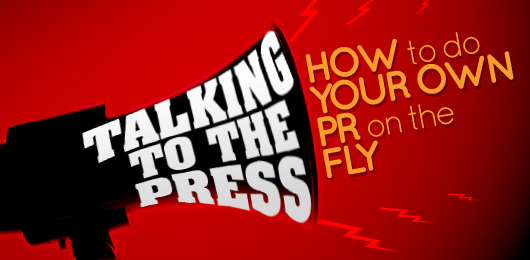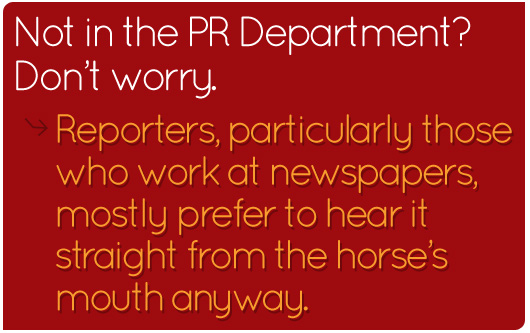Social media is cheap, fast and easy. But because it’s so cheap, fast and easy, millions have jumped on, and it’s getting harder for consumers to sift out a trusted authority. Where do they look, outside the hacks with free WordPress accounts? The media. Yeah, newspapers and magazines are dying – in print form. But that doesn’t discount the thousands of trustworthy blogs out there owned by newspaper companies written by reporters who’ve written about niche subjects, or “beats,” for decades.
But reaching out to a mostly cynical bunch of writers and editors constantly on deadline can be tough. After all, their jobs are to essentially bug people for information, so we can sniff out those annoying tactics from the subject line of a BCC’d mass email. While your company’s public relations department can be helpful, don’t solely rely on them. Reporters, particularly those who work at newspapers, mostly prefer to hear it straight from the horse’s mouth anyway. Whether you’re working on a campaign, promoting a small business or just trying to gain some street cred among colleagues, the media is a great outlet to start. We’ll go over the best ways to do your own PR on the fly by reaching out to reporters without getting the swat.
First, read the news. This sounds like a no-brainer, but hardly anyone our age reads the news anymore. Watching it on television is like buzzing through the top headlines in Google News without actually reading the content. Reading plenty of news–especially local–is the best resource for getting reporters’ insight and gets you familiar with story structure. Committing to reading at least one or two news stories a day will keep you in the know.
If you want to reach a reporter:
- Send a courtesy email. Email reporters who cover content related to your expertise. Mass e-mails beg for the ‘delete’ button. A personalized, thoughtful note with an included story idea will have more chances at starting a conversation. Make sure your information is relevant and devoid of “elevator” speech. For example, “Dear Ms. O’Neil, I’ve been following your coverage on crib recalls. I wanted to pass along a study you might be interested in pertaining to the decline in the quality of materials used to make cribs. Our organization has done some lobbying on the issue and I’d be more than happy to provide you with more information.” Remember, short and sweet means a chance to meet.
- Follow up with the phone. Call only as a follow-up to an email or to give story tips. Calling reporters can be tricky because they're almost never at their desks and they're constantly on crunch time. But a message asking, “Did you get that report I sent you last week?” can help get the ball rolling.
- Call back. In the event that you do get in touch with media, stay attentive to their deadlines. When a reporter leaves a message, try to make it a point to call that person back the same day, even if you don't have answers
- Meet. Sometimes all it takes is some face time. Schedule a time to meet with the reporter for lunch or coffee to talk about potential story ideas. (Quick tip: While it's always a gracious gesture to offer to pay, it's against journalism ethics to accept gifts.)
- Don’t be obnoxious. While journalists appreciate active and friendly sources, don’t go overboard. As I said before, we can sniff out a media whore from a mile away.
If a reporter contacts you:
- Ask for details. Before answering any questions, find out the name of the publication and what the reporter is writing about. Reporters aren’t out to get you. Unless they come from tabloids, most reporters are just looking to tell the many sides to every story, which can’t be told unless you talk to them.
- Return their calls by their deadlines. Try to return a phone call within a few hours, if possible. Respecting a deadline means the world to someone who needs to churn out 800 words within the time it takes to watch a movie.
- Remember you’re on the record. Don’t stray off on some rant on your competitor’s ethics or how much the CEO of your company sucks. Anything you say can be used in print, and nothing can be redacted. While that sounds a little scary, just don’t say anything stupid. If you need some time to think about your statements, just tell them you’ll call them back.
- Don't be afraid to say “no comment.” If you truly don’t know anything about the subject, or just don’t want to go on the record with anything, don’t be afraid to say so. Everyone appreciates honesty. To stay in the media’s good graces, offer to point them in the right direction: “I’m afraid I can’t go on the record about that, but I know someone who can” is still a helpful response.
If you do talk to the media, stay in touch. Even if a story doesn’t work out or gets drowned out by some major event, keep in touch with who you talked to. Call, shoot ‘em an email with updates or meet for coffee. Embracing the media as a business development tool gives you a guaranteed audience of thousands. Can your Twitter account do that?

















